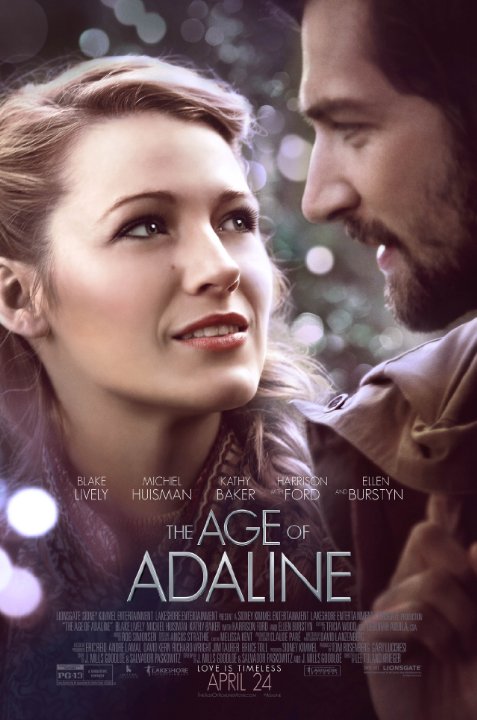This post is brought to you by Morgen B. She can now be found on Instagram: @guten_morgen14
“To love at all is to be vulnerable. Love anything and your heart will be wrung and possibly broken. If you want to make sure of keeping it intact you must give it to no one, not even an animal. Wrap it carefully round with hobbies and little luxuries; avoid all entanglements. Lock it up safe in the casket or coffin of your selfishness. But in that casket, safe, dark, motionless, airless, it will change. It will not be broken; it will become unbreakable, impenetrable, irredeemable. To love is to be vulnerable.” (C.S. Lewis The Four Loves)
I went to see The Age of Adaline because I think Blake Lively is beautiful. Was that a lousy reason to pay $10 plus Junior Mints to go sit in a dark room with strangers and endure 45 minutes worth of trailers? Maybe. I don’t think it was a great movie, to be honest. But there are some really important things beneath the surface of this pretty, glitzy, fairy-tale romance that are valuable, if not uncomfortable.
The premise of The Age of Adaline, while intriguing, was not necessarily something completely new. I was reminded of Benjamin Button, Tuck Everlasting, and maybe even a touch of Gatsby in its aesthetic at some points. Adaline Bowman, born in 1908, becomes immune to the aging process after an accident. In the search of anonymity and freedom for herself and her daughter, Adaline has been a rolling stone, moving from place to place, adopting one alias after another. She keeps her head down. She does not form attachments. When she finds herself being pursued and romanced by a persistent and charming fellow with a beard (and washboard abs, as it turns out), Adaline is faced with choosing love at the risk of revealing her secret, or the solitary but safe life she has maintained for decades. Somewhere in the mix we meet Harrison Ford, who spends most of his time staring at Adaline in deep confusion.
I’m guessing much of the audience that went to see this movie were women like me, star struck by Blake Lively’s perfect, perfect hair and well-placed beauty marks, her winsome femininity and the tragic romance between her and the hunky-dory-emphasis-on-the-hunky Michiel Huisman. After seeing the film, I explained it to friends as “Blake Lively plays dress up for two hours and then runs through the woods”, but really, part of the draw for me, at least, was the time-travel wardrobe. And in that aspect, it did not disappoint.
Adaline’s 1920’s wedding, with ornate art-deco styles and heavy makeup was stunning. Throughout the decades we see her as a woman frozen in time, but perpetually beautiful. When we see her in the present day, she has retained a sense of modern style, but with the timeless class and elements of each decade she has endured. Her high-waisted, button-up black pants had me nearly in tears. (However, I did notice a few gaps in the flashbacks. Were the ‘80s just not glamorous for her?)
In fact, I was so absorbed by her beautiful clothes, her hair in perfect, perfect pin curls, and her old-fashioned charm, that I was nearly blind to her misery. Adaline reminds me of Hans Christian Anderson’s Ice Queen. She is safe in her armor, but she has not lived a day since she started running. Despite her rooms full of beautiful dresses and keepsakes and books, she is deeply alone. And although I watched the movie and wanted to idolize Adaline for her superior, sophistication, and panache, I realized that I do not want to be her.
There is a conflict between my envy and desire to be beautiful and winsome like her, forever young, forever beautiful and sleek, and the very human need for the only kind of living that takes risk and vulnerability with other people. In the act of protecting herself and her secret, Adaline kept herself in a sepulcher of her own skin.
The film speaks to the fear that Western society has developed of aging, of becoming un-relevent, of losing attractiveness and edge. Adaline, though she has maintained that (the girl is 107 years old and using her iPhone while she drives her boo thang’s Saab like it’s no big deal), has surrendered human connection for the fear of being discovered. A few things in her struggle hit a little too close to home.
To love is to be vulnerable. Although I don’t think that most people with whom I have close relationships aren’t guarding a secret that would make them a side-show curiousity, like Adaline, I do believe that most everyone has secrets and mistakes that are lying under the surface. My own struggles and flaws impact my relationships, and color my conversations with insecurities and fear sometimes. But if it were easy to present my whole self, warts and all, in every friendship I had, there would be no value to vulnerability.
Myra Menke’s head is a flowerpot. In contrast to Adaline’s eternal youth and splendor, we meet her daughter, Flemming (unfortunate name), who must be in her 80’s. While Adaline is guarded, delicate, and soft-spoken, Flemming, through more brittle and wrinkly, has a vitality, a sparkle that sings of a real life beneath the surface. Here is another conflict for the audience. I have been taught that wrinkles are wrong, that age is a curse, but here is a woman who has friendships, who loves family and romance and life sitting across from another woman who, although she is the epitome of class and beauty, is empty.
Maybe the question or the conflict raised by Age of Adaline is that we ought to rethink the curse of time. I’ve already been told by multiple magazines that I need to be preventing wrinkles and age spots, and I’m not yet 21. It’s hard to tell myself that my hair, my skin, and my body really don’t matter in the grand scheme of things, when everything else says otherwise. How can I get the most life in my years when it feels like I’m supposed to be running away from the years entirely?
In my great twenty wise years of being quite nearly entirely single, I’ve picked up something that most people don’t know until they’re older: love is hard. I think the reason is vulnerability. While the years pass by and the trends cycle around and around, the core of us as humans persists. The need for connection, companionship, relationships, and love remains constant. But hiding and running away, while indeed a way to remain safe, ensure that no matter now long we live, we’ll never really be alive.

